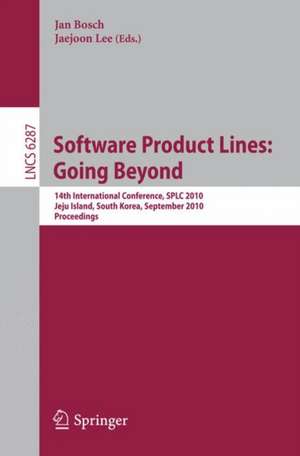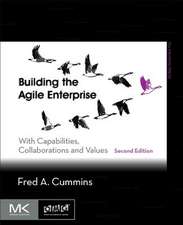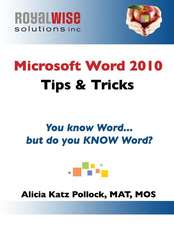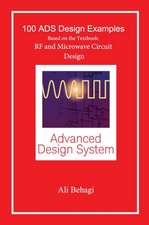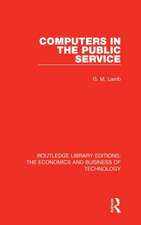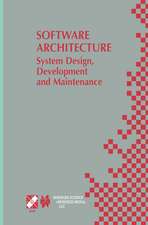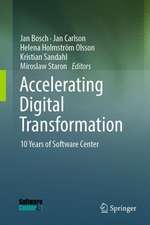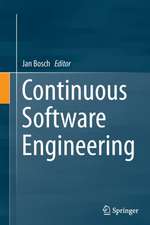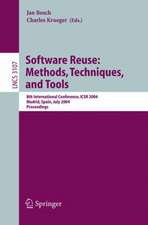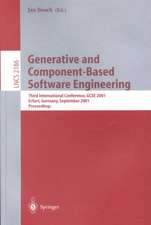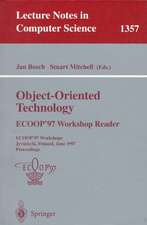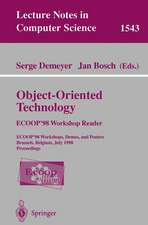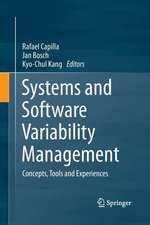Software Product Lines: Going Beyond: 14th International Conference, SPLC 2010, Jeju Island, South Korea, September 13-17, 2010. Proceedings: Lecture Notes in Computer Science, cartea 6287
Editat de Jan Bosch, Jaejoon Leeen Limba Engleză Paperback – 30 aug 2010
Din seria Lecture Notes in Computer Science
- 20%
 Preț: 1061.55 lei
Preț: 1061.55 lei - 20%
 Preț: 307.71 lei
Preț: 307.71 lei - 20%
 Preț: 438.69 lei
Preț: 438.69 lei - 20%
 Preț: 645.28 lei
Preț: 645.28 lei -
 Preț: 410.88 lei
Preț: 410.88 lei - 15%
 Preț: 580.46 lei
Preț: 580.46 lei - 17%
 Preț: 427.22 lei
Preț: 427.22 lei - 20%
 Preț: 596.46 lei
Preț: 596.46 lei -
 Preț: 381.21 lei
Preț: 381.21 lei - 20%
 Preț: 353.50 lei
Preț: 353.50 lei - 20%
 Preț: 1414.79 lei
Preț: 1414.79 lei - 20%
 Preț: 309.90 lei
Preț: 309.90 lei - 20%
 Preț: 583.40 lei
Preț: 583.40 lei - 20%
 Preț: 1075.26 lei
Preț: 1075.26 lei - 20%
 Preț: 310.26 lei
Preț: 310.26 lei - 20%
 Preț: 655.02 lei
Preț: 655.02 lei - 20%
 Preț: 580.93 lei
Preț: 580.93 lei - 20%
 Preț: 340.32 lei
Preț: 340.32 lei - 15%
 Preț: 438.59 lei
Preț: 438.59 lei - 20%
 Preț: 591.51 lei
Preț: 591.51 lei - 20%
 Preț: 649.49 lei
Preț: 649.49 lei - 20%
 Preț: 337.00 lei
Preț: 337.00 lei -
 Preț: 449.57 lei
Preț: 449.57 lei - 20%
 Preț: 607.39 lei
Preț: 607.39 lei - 20%
 Preț: 1024.44 lei
Preț: 1024.44 lei - 20%
 Preț: 579.30 lei
Preț: 579.30 lei - 20%
 Preț: 763.23 lei
Preț: 763.23 lei - 20%
 Preț: 453.32 lei
Preț: 453.32 lei - 20%
 Preț: 575.48 lei
Preț: 575.48 lei - 20%
 Preț: 585.88 lei
Preț: 585.88 lei - 20%
 Preț: 825.93 lei
Preț: 825.93 lei - 20%
 Preț: 763.23 lei
Preț: 763.23 lei - 17%
 Preț: 360.19 lei
Preț: 360.19 lei - 20%
 Preț: 1183.14 lei
Preț: 1183.14 lei - 20%
 Preț: 340.32 lei
Preț: 340.32 lei - 20%
 Preț: 504.57 lei
Preț: 504.57 lei - 20%
 Preț: 369.12 lei
Preț: 369.12 lei - 20%
 Preț: 583.40 lei
Preț: 583.40 lei - 20%
 Preț: 343.62 lei
Preț: 343.62 lei - 20%
 Preț: 350.21 lei
Preț: 350.21 lei - 20%
 Preț: 764.89 lei
Preț: 764.89 lei - 20%
 Preț: 583.40 lei
Preț: 583.40 lei -
 Preț: 389.48 lei
Preț: 389.48 lei - 20%
 Preț: 341.95 lei
Preț: 341.95 lei - 20%
 Preț: 238.01 lei
Preț: 238.01 lei - 20%
 Preț: 538.29 lei
Preț: 538.29 lei
Preț: 346.90 lei
Preț vechi: 433.62 lei
-20% Nou
Puncte Express: 520
Preț estimativ în valută:
66.38€ • 69.48$ • 55.25£
66.38€ • 69.48$ • 55.25£
Carte disponibilă
Livrare economică 10-24 martie
Preluare comenzi: 021 569.72.76
Specificații
ISBN-13: 9783642155789
ISBN-10: 3642155782
Pagini: 556
Ilustrații: XXI, 534 p. 159 illus.
Greutate: 0.82 kg
Ediția:2010
Editura: Springer Berlin, Heidelberg
Colecția Springer
Seriile Lecture Notes in Computer Science, Programming and Software Engineering
Locul publicării:Berlin, Heidelberg, Germany
ISBN-10: 3642155782
Pagini: 556
Ilustrații: XXI, 534 p. 159 illus.
Greutate: 0.82 kg
Ediția:2010
Editura: Springer Berlin, Heidelberg
Colecția Springer
Seriile Lecture Notes in Computer Science, Programming and Software Engineering
Locul publicării:Berlin, Heidelberg, Germany
Public țintă
ResearchCuprins
Product Line Context.- Context-Dependent Product Line Practice for Constructing Reliable Embedded Systems.- Configuring Software Product Line Feature Models Based on Stakeholders’ Soft and Hard Requirements.- Usage Context as Key Driver for Feature Selection.- Formal Approaches.- A Flexible Approach for Generating Product-Specific Documents in Product Lines.- Formal Definition of Syntax and Semantics for Documenting Variability in Activity Diagrams.- Delta-Oriented Programming of Software Product Lines.- Experience Papers.- Architecting Automotive Product Lines: Industrial Practice.- Developing a Software Product Line for Train Control: A Case Study of CVL.- Dealing with Cost Estimation in Software Product Lines: Experiences and Future Directions.- Variability Management.- Evolution of the Linux Kernel Variability Model.- Variability Modeling for Distributed Development – A Comparison with Established Practice.- Variability Management in Software Product Lines: An Investigation of Contemporary Industrial Challenges.- Product Validation 1.- Consistent Product Line Configuration across File Type and Product Line Boundaries.- Automated Incremental Pairwise Testing of Software Product Lines.- Linking Feature Models to Code Artifacts Using Executable Acceptance Tests.- Product Validation 2.- Avoiding Redundant Testing in Application Engineering.- Improving the Testing and Testability of Software Product Lines.- Architecture-Based Unit Testing of the Flight Software Product Line.- Feature Modeling.- Sans Constraints? Feature Diagrams vs. Feature Models.- Mapping Extended Feature Models to Constraint Logic Programming over Finite Domains.- Stratified Analytic Hierarchy Process: Prioritization and Selection of Software Features.- Examples of Product Lines.- StreamliningDomain Analysis for Digital Games Product Lines.- Designing and Prototyping Dynamic Software Product Lines: Techniques and Guidelines.- A Software Product Line for the Mobile and Context-Aware Applications Domain.- MDA and Business Context.- Using MDA for Integration of Heterogeneous Components in Software Supply Chains.- Mapping Features to Reusable Components: A Problem Frames-Based Approach.- Eliciting and Capturing Business Goals to Inform a Product Line’s Business Case and Architecture.- Aligning Business and Technical Strategies for Software Product Lines.- Short Papers.- Non-clausal Encoding of Feature Diagram for Automated Diagnosis.- A Method to Identify Feature Constraints Based on Feature Selections Mining.- Software Product Line Engineering for Long-Lived, Sustainable Systems.- An Approach to Efficient Product Configuration in Software Product Lines.- A Hybrid Approach to Feature-Oriented Programming in XVCL.- An Approach for Developing Component-Based Groupware Product Lines Using the Groupware Workbench.- Towards Consistent Evolution of Feature Models.- SOPLE-DE: An Approach to Design Service-Oriented Product Line Architectures.- Multidimensional Classification Approach for Defining Product Line Engineering Transition Strategies.- MARTE Mechanisms to Model Variability When Analyzing Embedded Software Product Lines.- The UML «extend» Relationship as Support for Software Variability.- Feature Diagrams as Package Dependencies.- Visualizing and Analyzing Software Variability with Bar Diagrams and Occurrence Matrices.- Recent Experiences with Software Product Lines in the US Department of Defense.- Posters.- Leviathan: SPL Support on Filesystem Level.- Introducing a Conceptual Model of Software Production.- Product Line Engineering in EnterpriseApplications.- Case Study of Software Product Line Engineering in Insurance Product.- Using Composition Connectors to Support Software Asset Development.- Feature-to-Code Mapping in Two Large Product Lines.- Panel Overviews.- The Rise and Fall of Product Line Architectures.- The Many Paths to Quality Core Assets.- Tutorial Overviews.- Pragmatic Strategies for Variability Management in Product Lines in Small- to Medium-Size Companies.- Building Reusable Testing Assets for a Software Product Line.- Production Planning in a Software Product Line Organization.- Transforming Legacy Systems into Software Product Lines.- Systems and Software Product Line Engineering with the SPL Lifecycle Framework.- Managing Requirements in Product Lines.- Evolutionary Product Line Scoping.- Leveraging Model Driven Engineering in Software Product Line Architectures.- to Software Product Lines Adoption.- to Software Product Lines.- Workshop Overviews.- 4th International Workshop on Dynamic Software Product Lines (DSPL 2010).- 1st International Workshop on Product-Line Engineering for Enterprise Resource Planning (ERP) Systems (PLEERPS 2010).- 2nd International Workshop on Model-Driven Approaches in Software Product Line Engineering (MAPLE 2010).- 1st International Workshop on Formal Methods in Software Product Line Engineering (FMSPLE 2010).- 3rd International Workshop on Visualisation in Software Product Line Engineering (VISPLE 2010).- 4th Workshop on Assessment of Contemporary Modularization Techniques (ACOM 2010).- 2nd Workshop on Scalable Modeling Techniques for Software Product Lines (SCALE 2010).
Caracteristici
Fast-track conference proceedings State-of-the-art research Up-to-date results
